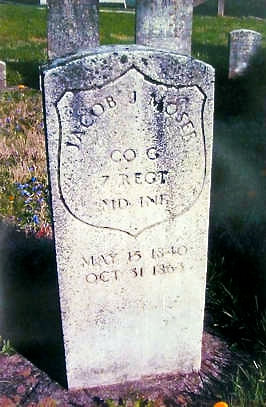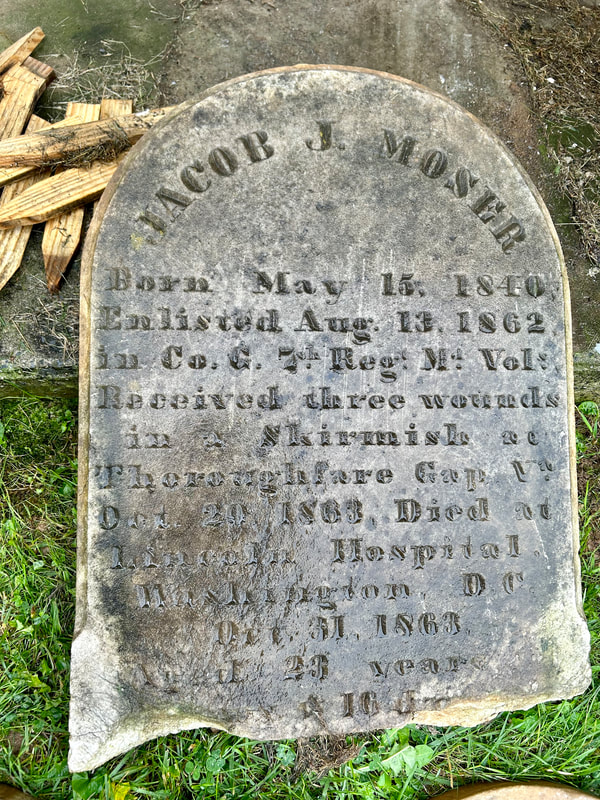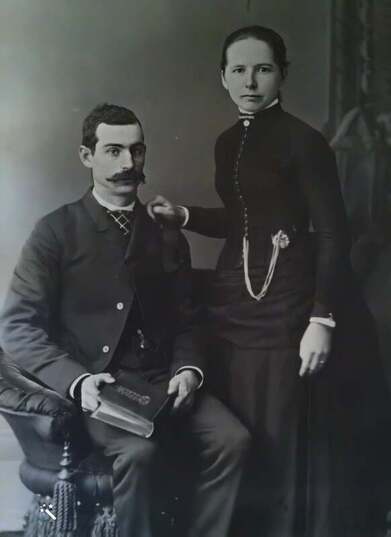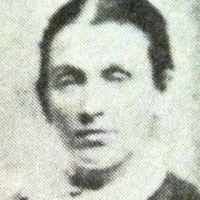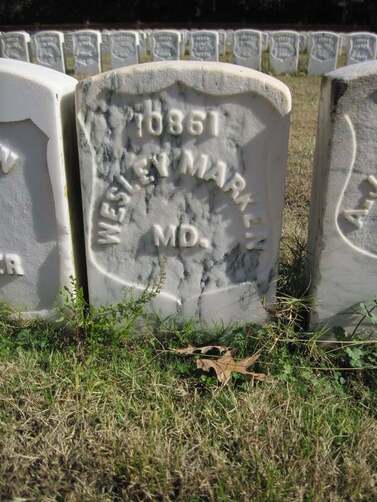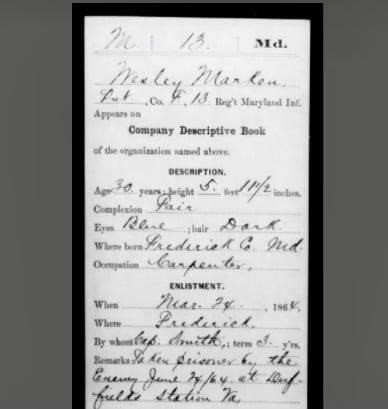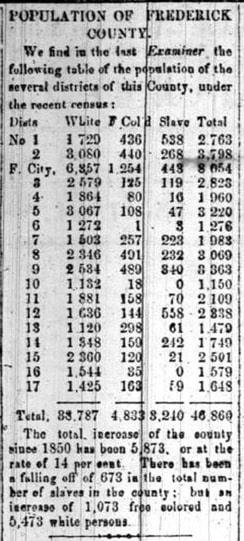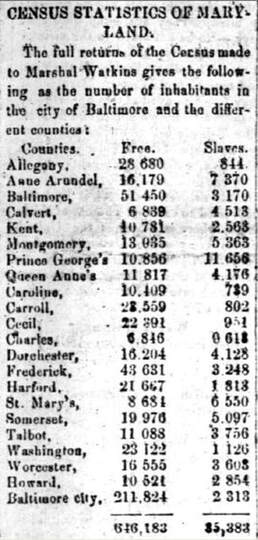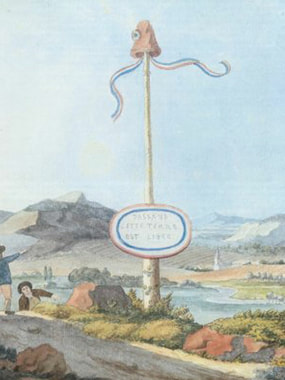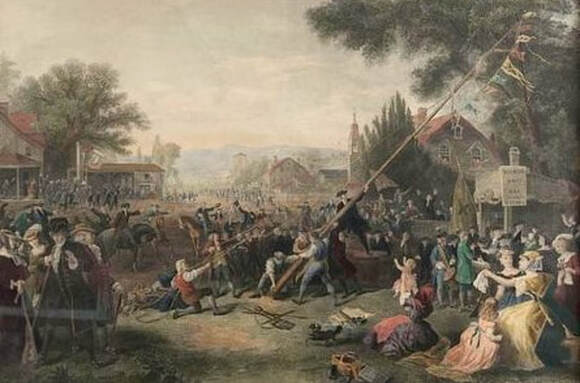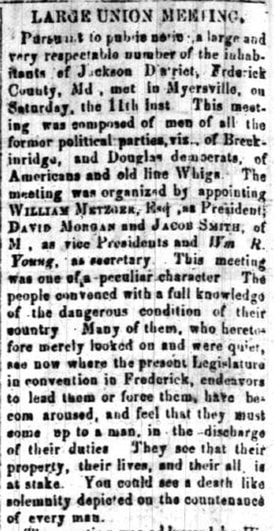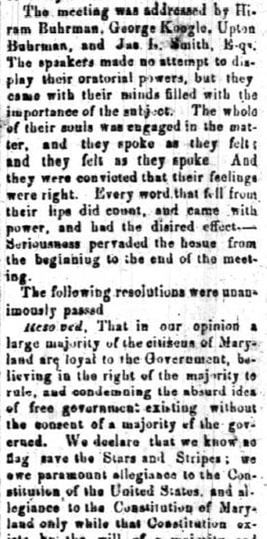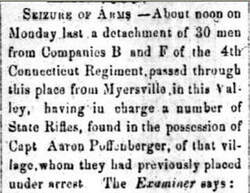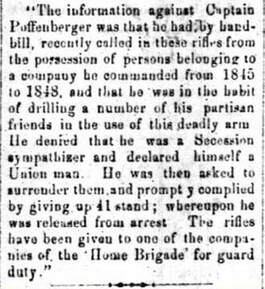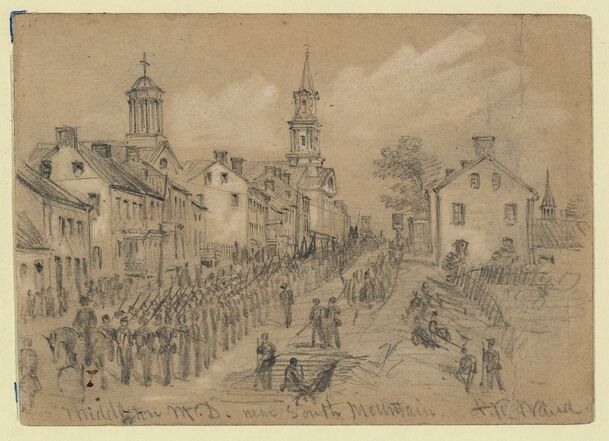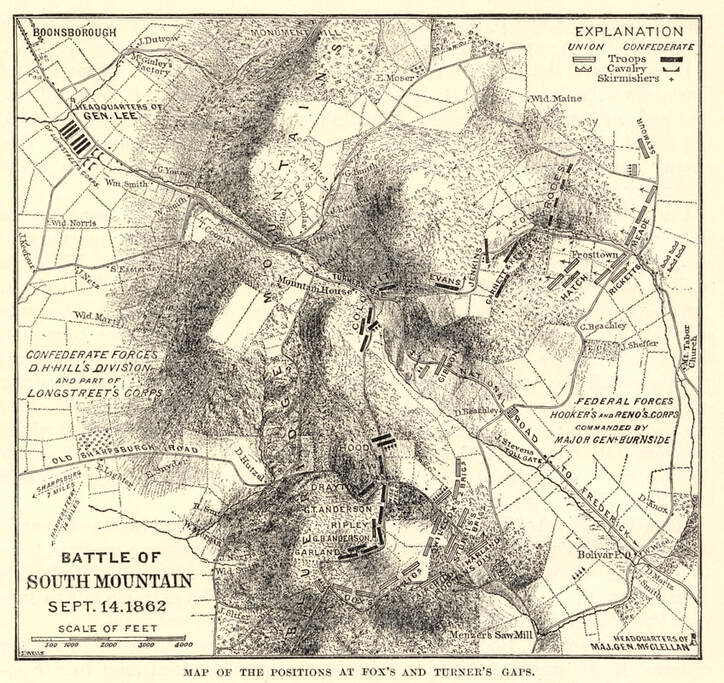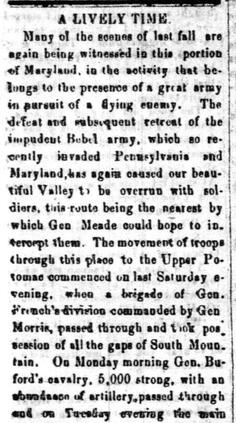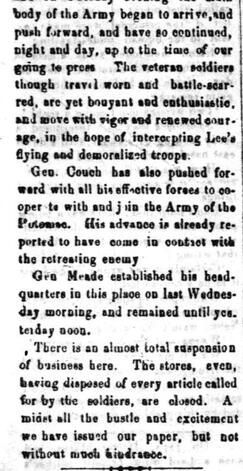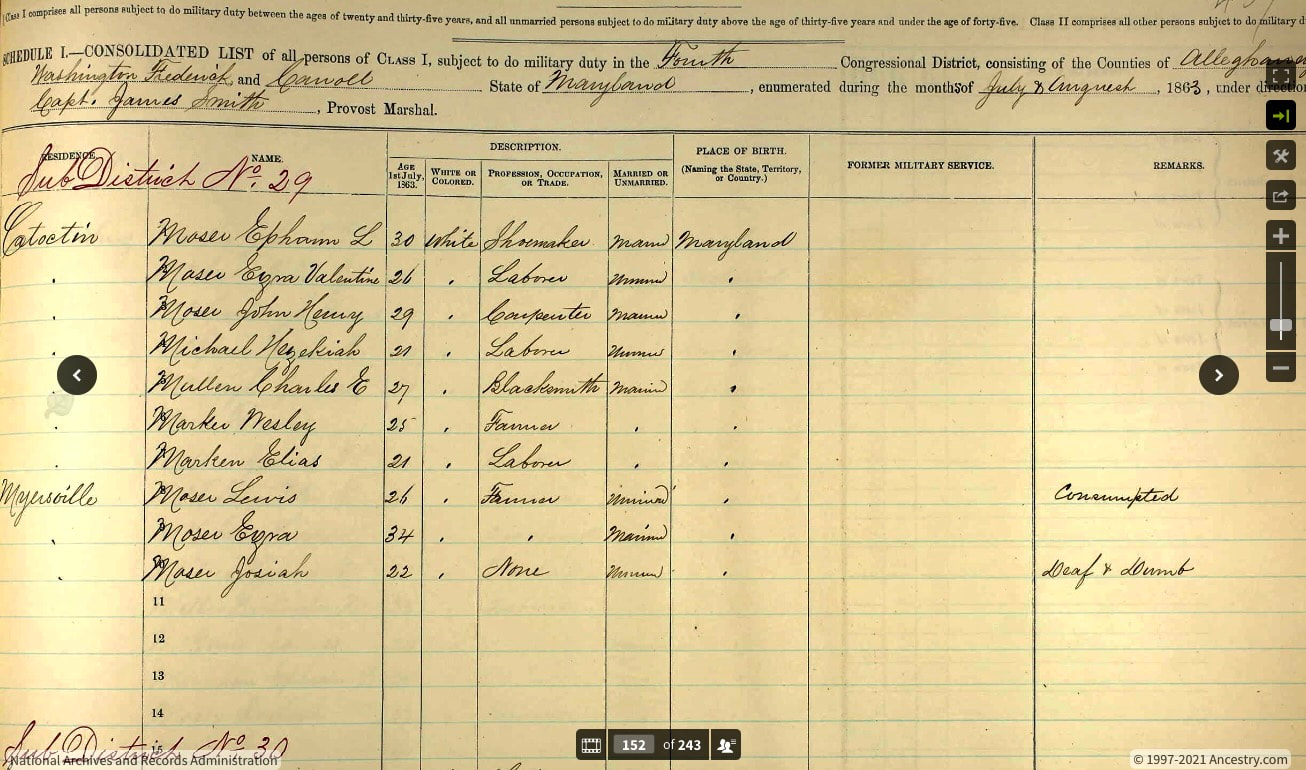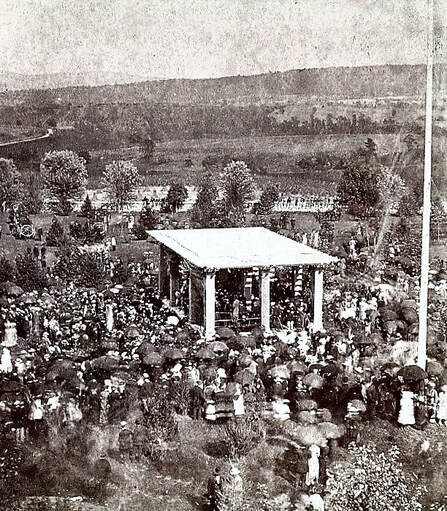The Myersville-Wolfsville Area During the Civil War
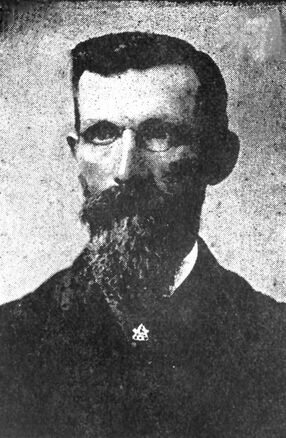
A Soldier Remembers
Daniel Hosea Mowen, who lived for many years in Wolfsville, Myersville, and finally Hagerstown, was born 28 November, 1839, in Pennsylvania. Both his parents died before he was 12. By August 1862, Mowen had relocated to Frederick County.
Mowen enlisted in C. F. Anderson’s Company I of the Union 7th Maryland Regiment for a three-year term. During the course of his service, he was wounded at the Battle of Spotsylvania Court House, heard the last speech of Abraham Lincoln at the White House, did guard duty at the Old Capital Prison on the night of the president’s assassination, and was present during the trial of the conspirators.
The autobiographical account that follows was written for the long-defunct Hagerstown Evening Globe newspaper late in Mowen’s life, but has never been published elsewhere.[1] This version has been edited for consistency and readability only.
Continue reading here.
Left: Daniel Mowen, taken from the 1905 History of Myersville.
Daniel Hosea Mowen, who lived for many years in Wolfsville, Myersville, and finally Hagerstown, was born 28 November, 1839, in Pennsylvania. Both his parents died before he was 12. By August 1862, Mowen had relocated to Frederick County.
Mowen enlisted in C. F. Anderson’s Company I of the Union 7th Maryland Regiment for a three-year term. During the course of his service, he was wounded at the Battle of Spotsylvania Court House, heard the last speech of Abraham Lincoln at the White House, did guard duty at the Old Capital Prison on the night of the president’s assassination, and was present during the trial of the conspirators.
The autobiographical account that follows was written for the long-defunct Hagerstown Evening Globe newspaper late in Mowen’s life, but has never been published elsewhere.[1] This version has been edited for consistency and readability only.
Continue reading here.
Left: Daniel Mowen, taken from the 1905 History of Myersville.
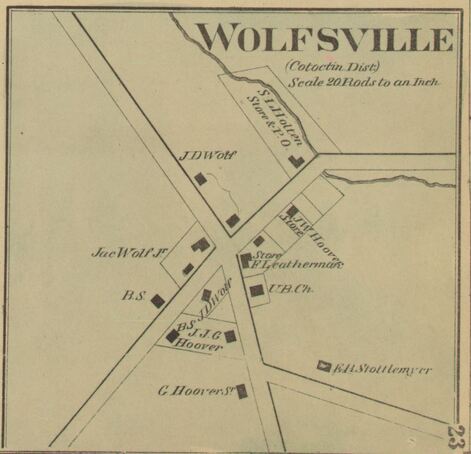
Wolfsville Occupied
By John A. Miller
Wolfsville is situated between the Catoctin and South Mountains and was a major crossroads at that time. Further up the road, about three miles to where South Mountain descends toward Smithsburg was another major crossroads. These roads could take you directly to modern day Thurmont, Hagerstown, Frederick, or Emmitsburg. Situated at the crossroads at Wolfsville is the Wolfe's Tavern. A place that was heavily guarded in November of 1861 during the Maryland special elections.
During the Pennsylvania Campaign in 1863, Union soldiers used Black Rock, which overlooked the Cumberland Valley, for observation of Lee’s Army after it retreated from Gettysburg. Black Rock is connected to Wolfsville via the old Black Rock Road that ran from east to west over South Mountain. Union patrols of cavalry garrisoned out of Harper’s Ferry also traveled through Wolfsville protecting the citizens against any Confederate raiding parties that might come into the area.
During General Jubal Early’s Raid on Washington, resulting in the Battle of Monocacy, General Early had sent Confederate soldiers on forage as well as picket duty along South Mountain in what is known as a “chain of pickets.” On July 8th, 1864, while the Confederate Army crossed South Mountain, about fifty Confederate soldiers occupied Wolfsville, guarding Early’s left flank as he encamped in Middletown that night. With the Battle of Monocacy raging in the open fields south of Frederick on July 9th, 1864, two Union scouts managed to enter their camp. From there the information was reported to the Union authorities on Maryland Heights.
After the Maryland Campaign in July of 1864, and the unsuccessful raid on Washington, General Jubal Early and his Confederate forces crossed the Potomac River back into Virginia near Leesburg at White’s Ford on July 14th. From there Early’s forces would take up the line of march toward the Shenandoah Valley. After a small victory at Cool Springs, Virginia on July 18th, 1864, and suffering defeat on the 20th at Rutherford’s Farm, General Early’s threat against the Union as well as Washington was thought to have come to an end. As a result Union General Horatio Wright abandoned his pursuit of Early’s Confederate forces and ordered the VI and XIX Corps to return to Washington, where they were to be sent to General Ulysses Grant at Petersburg.
To keep the Confederate Army of the Valley from threatening the north, General Wright left General George Crook with three divisions of infantry and some cavalry to hold Winchester. With orders to prevent Wright’s reinforcements from coming to Petersburg, General Early attacked Crook’s Department of West Virginia at Kernstown on July 24th. As long as Early’s Confederate forces continued to be a threat in the Shenandoah Valley, Grant would be forced to leave several Union troops to confront Early rather than using them as reinforcements at Petersburg. The fighting at Kernstown resulted in Crook’s defeat and forced him to retreat toward Maryland.
On July 25th, Crook was encamped at Bunker Hill, and reached the West Virginia side of the Potomac River facing Williamsport that night. On July 26th, General Crook was ordered to guard the mountain passes of South Mountain. By the 27th, Crook’s men entered Pleasant Valley via the C&O Canal near Harper’s Ferry for the night. The next day, Crook was ordered by General David Hunter to concentrate his forces at Halltown, since it was fortified. Crook’s men re-crossed the Potomac River and encamped near Halltown, West Virginia.
General Early had enough of the new Federal policy of destruction and had selected Chambersburg, Pennsylvania, as the location of where the retaliation would be made. On July 28th, an unusual order arrived from General Early to General John McCausland. General Early demanded $100,000 in gold or $500,000 in U.S. currency in compensation for the homes destroyed by Union General Hunter in the Shenandoah Valley near Lynchburg. Early ordered McCausland to enter Pennsylvania and ransom the town of Chambersburg. If the city could not produce the funds the city would be burned. Later McCausland wrote: “My men had just dismounted and were making camp and getting ready to eat what rations they could find. I was sitting there on my horse talking to Nick Fitzhugh, my adjutant, when a courier handed me a dispatch from Early. I opened it up and when I read those first lines I nearly fell out of the saddle. He ordered me in very few words to make a retaliatory raid and give the Yankees a taste of their own medicine.”
Early in the morning on July 30th, the Confederate forces under General John McCausland entered Chambersburg in three columns. After meeting with the citizens of Chambersburg, the leading townspeople informed McCausland that the city could not or would not pay. As a result McCausland ordered torches to be ignited and soon three quarters of the town was fully engulfed in flames. In response to General McCausland at Chambersburg, as well as numerous raiding parties reported along the Mason & Dixon Line, General Halleck ordered General Hunter to send troops to advance to the eastern side of South Mountain and occupy Crampton’s Gap and the other South Mountain passes. General Hunter sent a small cavalry force to occupy Turner’s Gap on South Mountain in order for them to communicate with him by courier if any Confederate troop movements appeared in the area.
After hearing reports of Confederate cavalry raiding along the Mason Dixon Line in Pennsylvania as well as in Northern Maryland General William W. Averell, commanding Crook’s Second Cavalry Division investigated the situation. Members of Cole’s Cavalry had seen the smoke from the distance and knew right away that Chambersburg had been burned. General Averell would now begin the pursuit of McCausland’s cavalry force. General Alfred Duffie’s First Cavalry Division was ordered to proceed to the Middletown Valley.
On July 31st, General David Hunter was ordered by General Henry Hallack to move to Emmitsburg, Maryland. This dispatch from Hallack made General Hunter very upset but regardless of his personal views, after four o’clock in the afternoon, General Hunter was moving toward Emmitsburg. In doing so, he sent General Crook on the road to Middletown and General Wright on the road to Frederick. The Federal Departments, fearing an absence of troops on the eastern side of South Mountain toward Emmitsburg began to follow up on the pursuit of the Confederate troops of McCausland’s Cavalry.
General Crook’s force left Halltown, crossed the Potomac River at Sandy Point and marched directly to Burkittsville taking the direct route through Middletown. Marching past Middletown, Crook’s forces encamped near Wolfsville that night, covering some fourteen miles that afternoon. The intense summer sun was immensely hot for the footmen of Crook’s army. Many of the men suffered sun stroke and some even died from the horrendous weather conditions. Even the men of future President Rutherford B. Hayes’ brigade were in poor shape from the hot summer heat.
On August 1st, Crook’s men marched another four miles, halted on the road and camped in the woods near Wolfsville. During the day it was reported from High Rock, some ten miles away on the ridge of South Mountain, that Chambersburg was burned by the Confederates. Throughout the day General David Hunter communicated with General Crook about the recent Confederate raid into Pennsylvania. While Crook was dealing with the situation, his brigade officers found time to write their official reports about the recent Battle of Kernstown.
Detachments of General Duffie’s cavalry had been in the saddle since that morning without any rations or provisions to eat. The intense hot weather and the lack of food made the march very rough for the mounted men. Upon entering the town, the men thought they would be supplied with provisions from the townspeople, but unfortunately for them, the town’s residents were all out of provisions. Later in the day, the cavalrymen drew their four day rations and around six o’clock were ordered to proceed to Smithsburg where they encamped for the night. From there Duffie’s Cavalry was ordered to move on to Hagerstown and then to Clearspring to reinforce Averell.
The next day Crook’s Department of West Virginia was still encamped in the woods as well as the fields surrounding Wolfsville. Pickets were thrown up while the soldiers found time to rest, relax, and even wash their clothes in the nearby creek. Many of the soldiers wondered why they were encamped at Wolfsville. While the footman of Crook’s First Division, Second Brigade under Colonel William Ely and the soldiers of the 11th West Virginia Infantry detached from Colonel James Mulligan’s Third Division, Second Brigade was enjoying the day.
On August 3rd, General Crook ordered his command to leave camp at three o’clock in the morning and begin the march toward Frederick. His rested troops would encamp later that night along the banks of the Monocacy River. With General Early still being a threat, General Grant ordered the VI and XIX Corps to the Shenandoah Valley and formed the Army of the Shenandoah with General Philip H. Sheridan. Sheridan took command on August 8th, 1864, and soon after the fight for “The Valley” would begin and the destruction of General Jubal Early’s Army would soon come to a climax that fall.
By John A. Miller
Wolfsville is situated between the Catoctin and South Mountains and was a major crossroads at that time. Further up the road, about three miles to where South Mountain descends toward Smithsburg was another major crossroads. These roads could take you directly to modern day Thurmont, Hagerstown, Frederick, or Emmitsburg. Situated at the crossroads at Wolfsville is the Wolfe's Tavern. A place that was heavily guarded in November of 1861 during the Maryland special elections.
During the Pennsylvania Campaign in 1863, Union soldiers used Black Rock, which overlooked the Cumberland Valley, for observation of Lee’s Army after it retreated from Gettysburg. Black Rock is connected to Wolfsville via the old Black Rock Road that ran from east to west over South Mountain. Union patrols of cavalry garrisoned out of Harper’s Ferry also traveled through Wolfsville protecting the citizens against any Confederate raiding parties that might come into the area.
During General Jubal Early’s Raid on Washington, resulting in the Battle of Monocacy, General Early had sent Confederate soldiers on forage as well as picket duty along South Mountain in what is known as a “chain of pickets.” On July 8th, 1864, while the Confederate Army crossed South Mountain, about fifty Confederate soldiers occupied Wolfsville, guarding Early’s left flank as he encamped in Middletown that night. With the Battle of Monocacy raging in the open fields south of Frederick on July 9th, 1864, two Union scouts managed to enter their camp. From there the information was reported to the Union authorities on Maryland Heights.
After the Maryland Campaign in July of 1864, and the unsuccessful raid on Washington, General Jubal Early and his Confederate forces crossed the Potomac River back into Virginia near Leesburg at White’s Ford on July 14th. From there Early’s forces would take up the line of march toward the Shenandoah Valley. After a small victory at Cool Springs, Virginia on July 18th, 1864, and suffering defeat on the 20th at Rutherford’s Farm, General Early’s threat against the Union as well as Washington was thought to have come to an end. As a result Union General Horatio Wright abandoned his pursuit of Early’s Confederate forces and ordered the VI and XIX Corps to return to Washington, where they were to be sent to General Ulysses Grant at Petersburg.
To keep the Confederate Army of the Valley from threatening the north, General Wright left General George Crook with three divisions of infantry and some cavalry to hold Winchester. With orders to prevent Wright’s reinforcements from coming to Petersburg, General Early attacked Crook’s Department of West Virginia at Kernstown on July 24th. As long as Early’s Confederate forces continued to be a threat in the Shenandoah Valley, Grant would be forced to leave several Union troops to confront Early rather than using them as reinforcements at Petersburg. The fighting at Kernstown resulted in Crook’s defeat and forced him to retreat toward Maryland.
On July 25th, Crook was encamped at Bunker Hill, and reached the West Virginia side of the Potomac River facing Williamsport that night. On July 26th, General Crook was ordered to guard the mountain passes of South Mountain. By the 27th, Crook’s men entered Pleasant Valley via the C&O Canal near Harper’s Ferry for the night. The next day, Crook was ordered by General David Hunter to concentrate his forces at Halltown, since it was fortified. Crook’s men re-crossed the Potomac River and encamped near Halltown, West Virginia.
General Early had enough of the new Federal policy of destruction and had selected Chambersburg, Pennsylvania, as the location of where the retaliation would be made. On July 28th, an unusual order arrived from General Early to General John McCausland. General Early demanded $100,000 in gold or $500,000 in U.S. currency in compensation for the homes destroyed by Union General Hunter in the Shenandoah Valley near Lynchburg. Early ordered McCausland to enter Pennsylvania and ransom the town of Chambersburg. If the city could not produce the funds the city would be burned. Later McCausland wrote: “My men had just dismounted and were making camp and getting ready to eat what rations they could find. I was sitting there on my horse talking to Nick Fitzhugh, my adjutant, when a courier handed me a dispatch from Early. I opened it up and when I read those first lines I nearly fell out of the saddle. He ordered me in very few words to make a retaliatory raid and give the Yankees a taste of their own medicine.”
Early in the morning on July 30th, the Confederate forces under General John McCausland entered Chambersburg in three columns. After meeting with the citizens of Chambersburg, the leading townspeople informed McCausland that the city could not or would not pay. As a result McCausland ordered torches to be ignited and soon three quarters of the town was fully engulfed in flames. In response to General McCausland at Chambersburg, as well as numerous raiding parties reported along the Mason & Dixon Line, General Halleck ordered General Hunter to send troops to advance to the eastern side of South Mountain and occupy Crampton’s Gap and the other South Mountain passes. General Hunter sent a small cavalry force to occupy Turner’s Gap on South Mountain in order for them to communicate with him by courier if any Confederate troop movements appeared in the area.
After hearing reports of Confederate cavalry raiding along the Mason Dixon Line in Pennsylvania as well as in Northern Maryland General William W. Averell, commanding Crook’s Second Cavalry Division investigated the situation. Members of Cole’s Cavalry had seen the smoke from the distance and knew right away that Chambersburg had been burned. General Averell would now begin the pursuit of McCausland’s cavalry force. General Alfred Duffie’s First Cavalry Division was ordered to proceed to the Middletown Valley.
On July 31st, General David Hunter was ordered by General Henry Hallack to move to Emmitsburg, Maryland. This dispatch from Hallack made General Hunter very upset but regardless of his personal views, after four o’clock in the afternoon, General Hunter was moving toward Emmitsburg. In doing so, he sent General Crook on the road to Middletown and General Wright on the road to Frederick. The Federal Departments, fearing an absence of troops on the eastern side of South Mountain toward Emmitsburg began to follow up on the pursuit of the Confederate troops of McCausland’s Cavalry.
General Crook’s force left Halltown, crossed the Potomac River at Sandy Point and marched directly to Burkittsville taking the direct route through Middletown. Marching past Middletown, Crook’s forces encamped near Wolfsville that night, covering some fourteen miles that afternoon. The intense summer sun was immensely hot for the footmen of Crook’s army. Many of the men suffered sun stroke and some even died from the horrendous weather conditions. Even the men of future President Rutherford B. Hayes’ brigade were in poor shape from the hot summer heat.
On August 1st, Crook’s men marched another four miles, halted on the road and camped in the woods near Wolfsville. During the day it was reported from High Rock, some ten miles away on the ridge of South Mountain, that Chambersburg was burned by the Confederates. Throughout the day General David Hunter communicated with General Crook about the recent Confederate raid into Pennsylvania. While Crook was dealing with the situation, his brigade officers found time to write their official reports about the recent Battle of Kernstown.
Detachments of General Duffie’s cavalry had been in the saddle since that morning without any rations or provisions to eat. The intense hot weather and the lack of food made the march very rough for the mounted men. Upon entering the town, the men thought they would be supplied with provisions from the townspeople, but unfortunately for them, the town’s residents were all out of provisions. Later in the day, the cavalrymen drew their four day rations and around six o’clock were ordered to proceed to Smithsburg where they encamped for the night. From there Duffie’s Cavalry was ordered to move on to Hagerstown and then to Clearspring to reinforce Averell.
The next day Crook’s Department of West Virginia was still encamped in the woods as well as the fields surrounding Wolfsville. Pickets were thrown up while the soldiers found time to rest, relax, and even wash their clothes in the nearby creek. Many of the soldiers wondered why they were encamped at Wolfsville. While the footman of Crook’s First Division, Second Brigade under Colonel William Ely and the soldiers of the 11th West Virginia Infantry detached from Colonel James Mulligan’s Third Division, Second Brigade was enjoying the day.
On August 3rd, General Crook ordered his command to leave camp at three o’clock in the morning and begin the march toward Frederick. His rested troops would encamp later that night along the banks of the Monocacy River. With General Early still being a threat, General Grant ordered the VI and XIX Corps to the Shenandoah Valley and formed the Army of the Shenandoah with General Philip H. Sheridan. Sheridan took command on August 8th, 1864, and soon after the fight for “The Valley” would begin and the destruction of General Jubal Early’s Army would soon come to a climax that fall.
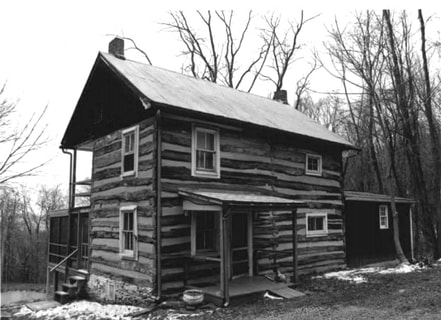
Warrenfelz Log House, 9478 Frostown Road, Near Myersville, 1992
From an historical survey of the property: "Built originally about 1850 as a one-story, one-room dwelling, the house was enlarged with a second section of two stories on the south and the roof of the original part raised to provide a second story ... The property also includes a meat house and a frame and stone bank barn, both in deteriorated condition, and two springs in the slope below the house. 'The house was probably built during the period 1850-1870 by a member of the Warrenfeltz family... Located deep within the ravine on the north side of South Mountain at Turner's Gap, [the house] was not shielded from the battle [of South Mountain] by its remote location. Chased by the men of General George Meade's Division, the retreating regiments of General Robert Rodes' Brigade were funneled by the ravine dangerously near the simple log home of the Warrenfeltz family. Rodes' Alabama Brigade of only 1,200 men was stretched across the ravine north of Turner's Gap in a desperate attempt to protect the north approaches to the gap....The Warrenfeltz house would have been directly in the center of the battle."
From an historical survey of the property: "Built originally about 1850 as a one-story, one-room dwelling, the house was enlarged with a second section of two stories on the south and the roof of the original part raised to provide a second story ... The property also includes a meat house and a frame and stone bank barn, both in deteriorated condition, and two springs in the slope below the house. 'The house was probably built during the period 1850-1870 by a member of the Warrenfeltz family... Located deep within the ravine on the north side of South Mountain at Turner's Gap, [the house] was not shielded from the battle [of South Mountain] by its remote location. Chased by the men of General George Meade's Division, the retreating regiments of General Robert Rodes' Brigade were funneled by the ravine dangerously near the simple log home of the Warrenfeltz family. Rodes' Alabama Brigade of only 1,200 men was stretched across the ravine north of Turner's Gap in a desperate attempt to protect the north approaches to the gap....The Warrenfeltz house would have been directly in the center of the battle."
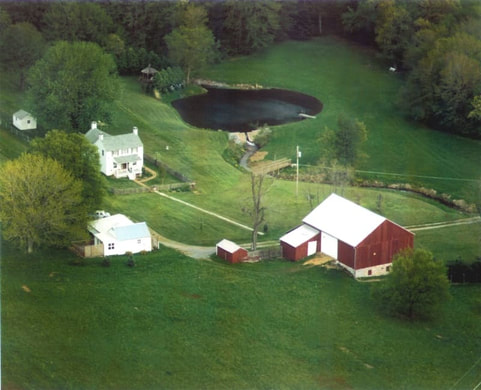
George Blessing: Hero of the Highland
Born: 15 February, 1794
Frederick County, Maryland, USA
Died: 17 December, 1873 (aged 79)
Wolfsville, Frederick County, Maryland
Buried: Saint Johns Lutheran Church Cemetery
Ellerton, Frederick County, Maryland
Right: The possible site of George Blessing's skirmish with Confederate raiders.
In July 1864, Confederates were in the vicinity of Wolfsville. The Union was present in the area, too. One nearby Union officer was Corporal Christopher Armour Newcomer. After the war, he wrote a memoir titled Cole’s Cavalry, or Three Years in the Saddle in the Shenandoah Valley. In his book, he provides the only unadulterated account of the skirmish between George Blessing, who was awarded the sobriquet "Hero of Highland" by the press.
Here is Newcomer's complete account:
Born: 15 February, 1794
Frederick County, Maryland, USA
Died: 17 December, 1873 (aged 79)
Wolfsville, Frederick County, Maryland
Buried: Saint Johns Lutheran Church Cemetery
Ellerton, Frederick County, Maryland
Right: The possible site of George Blessing's skirmish with Confederate raiders.
In July 1864, Confederates were in the vicinity of Wolfsville. The Union was present in the area, too. One nearby Union officer was Corporal Christopher Armour Newcomer. After the war, he wrote a memoir titled Cole’s Cavalry, or Three Years in the Saddle in the Shenandoah Valley. In his book, he provides the only unadulterated account of the skirmish between George Blessing, who was awarded the sobriquet "Hero of Highland" by the press.
Here is Newcomer's complete account:
The battle of Monocacy had been fought. Lieutenant Colonel Vernon and his small force of sixty-five men were familiar with the country. The enemy's Cavalry were overrunning Frederick County in small detachments, gathering up horses from the farmers. Our detachment had come upon several small squads of Rebel Cavalrymen and either captured or dispersed them. On our arrival in the neighborhood of Middletown we were informed by the citizens that an old gentleman, a farmer by the name of George Blessing, living several miles distant, had shot one or more Rebels, and Colonel Vernon started at once with his men for Blessing's farm.
As our advance was proceeding up the lane leading to the farmer's house, they were halted by an old gray-haired man, fully sixty-five years of age, who demanded that they should go back, or he would shoot. The old gentleman was partially concealed behind a large tree, with a rifle in his hand. Colonel Vernon called him by name and informed him we were Cole's men and had come to protect him. Mr. Blessing gave us a hearty welcome and said he had mistaken us for the Confederates whom he had exchanged shots with a number of times during the day, and had driven off the enemy not an hour be-fore, who threatened to return and hang him and burn his property.
To prove his assertion, he led the way up to his barnyard, where lay a dead Rebel and one in the barn, wounded. The old farmer had some half dozen guns of different patterns; when the roving bands of Confederates approached his house he would warn them off, they would fire upon him, and this old patriot stood his ground. He would do the shooting whilst his small grandson would load the pieces. Our command remained at the farm house overnight and the "Johnnie Rebs" failed to put in an appearance; they would have received a warm reception If they had returned. Our men buried the dead soldier and left the wounded prisoner in the hands of his captor, who promised to have him properly taken care of. On the following morning we made an early start in the direction of Frederick, picking up an occasional straggler.
The story of George Blessing's bravery against the Confederate raiders would be embellished by the press, and even moreso, thanks in part to his niece, Nellie Blessing Eyster, a writer whose highly embroidered short story about the skirmish appeared in California Ladies Magazine’s August 1903 issue.
Blessing himself remarked of the Hero of Highland legend, “What nonsense if they mean me.”
As our advance was proceeding up the lane leading to the farmer's house, they were halted by an old gray-haired man, fully sixty-five years of age, who demanded that they should go back, or he would shoot. The old gentleman was partially concealed behind a large tree, with a rifle in his hand. Colonel Vernon called him by name and informed him we were Cole's men and had come to protect him. Mr. Blessing gave us a hearty welcome and said he had mistaken us for the Confederates whom he had exchanged shots with a number of times during the day, and had driven off the enemy not an hour be-fore, who threatened to return and hang him and burn his property.
To prove his assertion, he led the way up to his barnyard, where lay a dead Rebel and one in the barn, wounded. The old farmer had some half dozen guns of different patterns; when the roving bands of Confederates approached his house he would warn them off, they would fire upon him, and this old patriot stood his ground. He would do the shooting whilst his small grandson would load the pieces. Our command remained at the farm house overnight and the "Johnnie Rebs" failed to put in an appearance; they would have received a warm reception If they had returned. Our men buried the dead soldier and left the wounded prisoner in the hands of his captor, who promised to have him properly taken care of. On the following morning we made an early start in the direction of Frederick, picking up an occasional straggler.
The story of George Blessing's bravery against the Confederate raiders would be embellished by the press, and even moreso, thanks in part to his niece, Nellie Blessing Eyster, a writer whose highly embroidered short story about the skirmish appeared in California Ladies Magazine’s August 1903 issue.
Blessing himself remarked of the Hero of Highland legend, “What nonsense if they mean me.”
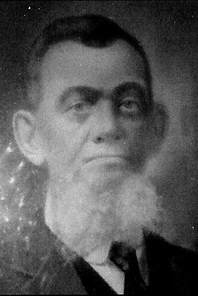
Jacob Koogle (1841–1915), War Hero and Congressional Medal of Honor Winner
During the Civil War, Koogle served as a first lieutenant in Company G, 7th Maryland Infantry. He received the Medal of Honor for capturing the flag at the Battle of Five Forks, Virginia, on 1 April, 1865. The Medal was bestowed on him a little over a month later, on 10 May. Koogle was later promoted to captain.
Jacob Koogle was born December 5, 1841 at Myersville, Maryland. The 1860 census lists him as a farmer. One of nine children of Adam and Magdalena Koogle residing in Frederick County, He was 5' 8" tall with a fair complexion, sandy hair and grey eyes. At age 20, on 13 August, 1862, at Middletown, he enlisted as a private in Company G, 7th Maryland Infantry Regiment. Most of the line officers and men were substantial farmers, mechanics, and laborers from the rural districts. This regiment was recruited from the northern line of Maryland counties, under the call of 1 July, 1862, for "three years or the war."
To read more of this article about Koogle and an honor ceremony held at his grave in 2009, click here.
During the Civil War, Koogle served as a first lieutenant in Company G, 7th Maryland Infantry. He received the Medal of Honor for capturing the flag at the Battle of Five Forks, Virginia, on 1 April, 1865. The Medal was bestowed on him a little over a month later, on 10 May. Koogle was later promoted to captain.
Jacob Koogle was born December 5, 1841 at Myersville, Maryland. The 1860 census lists him as a farmer. One of nine children of Adam and Magdalena Koogle residing in Frederick County, He was 5' 8" tall with a fair complexion, sandy hair and grey eyes. At age 20, on 13 August, 1862, at Middletown, he enlisted as a private in Company G, 7th Maryland Infantry Regiment. Most of the line officers and men were substantial farmers, mechanics, and laborers from the rural districts. This regiment was recruited from the northern line of Maryland counties, under the call of 1 July, 1862, for "three years or the war."
To read more of this article about Koogle and an honor ceremony held at his grave in 2009, click here.
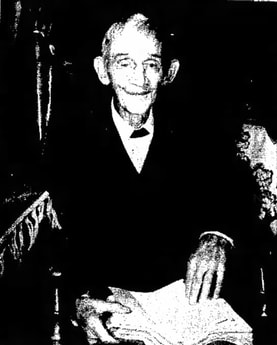
John Caleb Leatherman's Civil War Memories
Hagerstown Daily Mail, Monday 8 May, 1950.
John Leatherman was born on a farm near Harmony, a small village which is in turn near Myersville, on December 15, 1852. He was just ten years old when the Civil War was seeing its first real bloodshed in the Maryland campaign of 1862. Particularly vivid for him is the recollection of the morning in September of that year, when the Confederate troops marched past his home on their way to Middletown the same day found a larger Union detachment in hot pursuit of the Rebels, and that night Northern troops decided to camp in the six-mile area between Middletown and Harmony, on the eve of the Battle of South Mountain.
"We were Unionists, of course," says John Leatherman today, "so naturally we were glad to see the Federal troops, and Father more than welcomed them to the use of his fields. We had wondered at the Confederates passing through so hastily and not even offering to steal our horses, but as we found out later they didn't have time to stop for anything. I remember that evening, the thirteenth, an orderly of one of the Union officers came up to up to the house and asked if he could buy some bread, butter, and other foodstuffs for the officers. Mother said they were welcome to all she could spare, of course. She was down to the springhouse getting things together for the fellow when an enlisted man walked up swinging a stick. He asked if she could spare from food, too, and she said she was sorry but that she had already given all the food she could spare. The soldier kept standing therein the spring house, eying the three big, round loaves of bread that she had laid out on the bench for the orderly, and I was pretty sure I knew what was in his mind.
When Mother took the orderly back in the milk house to get some butter, the soldier suddenly jabs that stick into one loaf, then another, then the last one--and scooted out the door. I didn't say anything, of course. When Mother came and discovered the bread gone and he was already hot-footing it down through the meadow."
Three officers asked to use the Leathermans' spare room that night so they might a decent night's sleep. They were welcomed, of course, and young John went to bed thinking how safe and secure it seemed with real, live soldiers in the house--and all around the house! There were soldiers as far as he could see at dusk from Harmony to Middletown. But when John arose the next morning, September 14th, there wasn't a soldier in sight. Someone had come after the three officers in the middle of the night because of a hasty change of strategy. By six in the morning, Union and Confederate forces were already in a pitched battle on South Mountain. Young John sat fascinated all day, watching the trajectories of shells above the trees of the mountain, followed by the little puffs of smoke that marked their targets. The battle raged all that day and, two days later, continued at the illustrious Battle of Antietam--turning point of the Civil War.
John Leatherman recalls how his father and a neighbor by the name of Buzzard went up on South Mountain on the fifteenth, with shovels and picks, to bury the dead. He was told he was too small to go along, which hurt him deeply, but he wasn't too small to go with his mother to the Lutheran church in Middletown to take food to the wounded. Every bench in the church was being used as a bed, with wounded men writhing in pain and crying out for help. "I'll never forget that one poor man," says Leatherman, "lying there with just a stump sticking up where his one leg had been. I can still see his eyes today, the tragic way he looked up at me."
Some of Leatherman's favorite recollections are those that deal with the Blessing family, nearby neighbors. Later in the war, when the whole countryside was being plundered by wandering bands of Rebels: "Boy, that ol' George Blessing was a spunky one," says Leatherman. "Those Rebels were trying to get a hold of all the horses they could. When Father heard about it, he took his horses up into Pennsylvania. Not George Blessing--he just stood pat on his own farm there. When two Confederate soldiers showed up to search for his horses, he ordered them off of he'd shoot. They laughed at him--and he shot. He just wounded the one and the other high-tailed it. He didn't mean them no harm, though--he was a God-fearing man and peaceful, but he just didn't intend to let anyone take advantage of him. He took that wounded soldier up in the haymow of the barn and nursed him along, just as if he had been a Union man.
"Those Rebels sent ten men the next time, figuring they could scare him. Ol' George shouts a warning to them and they kept on coming, so he shouts again--and kills their leader dead on the spot. They left but they were coming back for sure then. It had gotten to be a matter of principle with them. They practically surrounded his farm with artillery then sent him a note to give up. He sent them a message back telling them to fire away--that they'd be killing their own buddy in the barn. He couldn't have held out indefinitely, of course, but luckily a special detachment of Union soldiers came to the rescue the next day, and drove the Rebels out of that community."
George Blessing was a hero of Young John's, even though he himself refused to be called a hero. He wasn't proud of having killed a rebel officer and the morning after the Union soldiers came to his defense, he gathered them all on the lawn before his house--and read aloud to them the 91st Psalm. He saw to it, too, that the man he had killed received a decent burial. And through all of this, George Blessing had been alone on his farm except for one daughter, aged eighteen--all the rest of the family having deserted him.
"That George Blessing," says Leatherman, "was one of the hottest Abolitionists I ever did see. The funny thing though, was that he had some slaves on his farm. He had married an Easterday girl from down around Jefferson and she had inherited some slaves. They weren't treated like slaves in that day--they were treated like humans. And ol' George freed them before the war started, long before the Emancipation Proclamation, and told them they could go their ways. 'Nary a one left the place, though. Every one of [them] stayed on until the day [they] died, and the Blessings buried them all eventually in a corner of St. John's Lutheran church yard, on Church Hill, about two miles from Myersville."
Read a full article on Leatherman here.
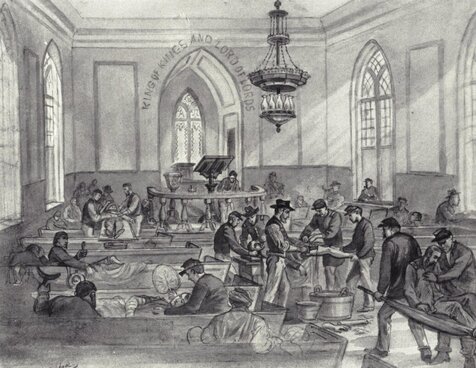
The Lutheran Church in Middletown with wounded arriving after the battle of South Mountain.
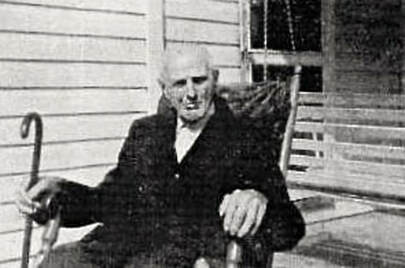
C. Upton Grossnickle's Civil War Memories
Charles Upton Grossnickle came into the world on the old Grossnickle homeplace near Wolfsville on 16 August, 1856, son of Elias Grossnickle (1829-1912) and Nancy Stottlemyer (1832-1888). He would grow up to become a farmer like his father, as well as a banker who lost his fortune in the Great Depression. Always a stalwart member of the Church of the Brethren, in December 1956 he was interviewed for The Brethren Evangelist. The lengthy article included personal memories from the war years:
"The Grossnickles were strong Union sympathizers…. In 1862, during the Battle of South Mountain, the cannon shots could be distinctly heard from the Grossnickle home. The hills intervening prevented seeing any smoke of battle, but each of time the cannon shots were heard, his mother and the other women present would cry. They knew that it meant death to the soldier boys.
"In 1863, when Lee’s men were on their way to Gettysburg, the sound of marching feet were heard along the rippling Catoctin. The soldiers, he said, marched two by two. They came by the Grossnickle Church [of the Brethren] but did not disturb it in any way. Neither did they bother any of the farm buildings. As they traveled, they were looking for horses. They looked over the Grossnickle’s horses, rejecting one in the field that was not up to their standards, taking the three good ones. When Upton’s father pleaded with them not to take his horses, the officer replied, ‘I will be tied to a stake and shot if I do not take them.’ There was nothing more to do but watch them leave.
"The soldiers were hungry and Upton’s mother baked bread and pies for them…. One of the Confederate soldiers, or ‘Rebels,’ as Upton called them, complained about not having a hat. ‘My father took the straw hat off my head and gave it to the boy. I do not know whether I had been fighting bees or not, but [I] had knocked the crown out of the hat. The soldier boy took it off his head, turned it over, and remarked, ‘This one doesn’t have any bottom in it.'"
Charles Upton Grossnickle came into the world on the old Grossnickle homeplace near Wolfsville on 16 August, 1856, son of Elias Grossnickle (1829-1912) and Nancy Stottlemyer (1832-1888). He would grow up to become a farmer like his father, as well as a banker who lost his fortune in the Great Depression. Always a stalwart member of the Church of the Brethren, in December 1956 he was interviewed for The Brethren Evangelist. The lengthy article included personal memories from the war years:
"The Grossnickles were strong Union sympathizers…. In 1862, during the Battle of South Mountain, the cannon shots could be distinctly heard from the Grossnickle home. The hills intervening prevented seeing any smoke of battle, but each of time the cannon shots were heard, his mother and the other women present would cry. They knew that it meant death to the soldier boys.
"In 1863, when Lee’s men were on their way to Gettysburg, the sound of marching feet were heard along the rippling Catoctin. The soldiers, he said, marched two by two. They came by the Grossnickle Church [of the Brethren] but did not disturb it in any way. Neither did they bother any of the farm buildings. As they traveled, they were looking for horses. They looked over the Grossnickle’s horses, rejecting one in the field that was not up to their standards, taking the three good ones. When Upton’s father pleaded with them not to take his horses, the officer replied, ‘I will be tied to a stake and shot if I do not take them.’ There was nothing more to do but watch them leave.
"The soldiers were hungry and Upton’s mother baked bread and pies for them…. One of the Confederate soldiers, or ‘Rebels,’ as Upton called them, complained about not having a hat. ‘My father took the straw hat off my head and gave it to the boy. I do not know whether I had been fighting bees or not, but [I] had knocked the crown out of the hat. The soldier boy took it off his head, turned it over, and remarked, ‘This one doesn’t have any bottom in it.'"
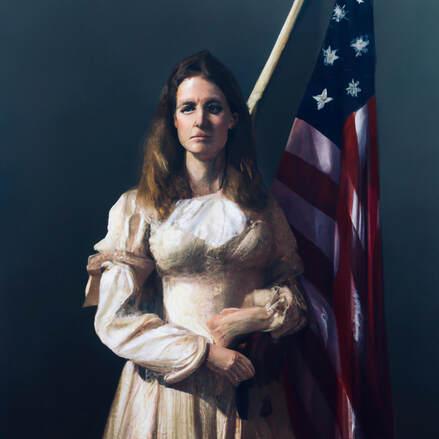
Brave Union Girl: The Unfamed Daring of Middletown’s Nannie Crouse
On September 10, 1862, a detachment of Confederate cavalry rode into Middletown, Frederick County, Maryland, led by their captain—a town native son—to search out an American flag. It was there as reported, suspended from the porch of a Main Street home and floating prettily in the breeze. Incensed, looking to fight, and not knowing the battle horrors that the next days would bring, some dozen of the cavalrymen dismounted and rushed up the steps to tear Old Glory down. But a proud seventeen-year-old stepped outside to confront them.
For her patriotism during that tumultuous week, teenager Nancy H. Crouse, known to her loved ones as Nannie, was hailed for a time as “Middletown’s Maid” or, later, “Middletown’s Barbara Fritchie.” But now her story molders in obscurity, even in her childhood hometown.
Read the full article here.
On September 10, 1862, a detachment of Confederate cavalry rode into Middletown, Frederick County, Maryland, led by their captain—a town native son—to search out an American flag. It was there as reported, suspended from the porch of a Main Street home and floating prettily in the breeze. Incensed, looking to fight, and not knowing the battle horrors that the next days would bring, some dozen of the cavalrymen dismounted and rushed up the steps to tear Old Glory down. But a proud seventeen-year-old stepped outside to confront them.
For her patriotism during that tumultuous week, teenager Nancy H. Crouse, known to her loved ones as Nannie, was hailed for a time as “Middletown’s Maid” or, later, “Middletown’s Barbara Fritchie.” But now her story molders in obscurity, even in her childhood hometown.
Read the full article here.
Wolfsville Local Loses Life in Andersonville
Wesley Marken (1832-1864) was born in Wolfsville to Samuel Marken (1775-1854) and Margaret Rebecca Brunner Marken (1800-1867). In 1854, Wesley married Sarah Elizabeth Haynes and by 1860, they had two daughters, Marietta and Ellen. A son named Samuel Franklin was born in 1861.
Late in the war, on 24 March, 1864, Marken joined the 1st Maryland Infantry, Company F, as a private. When he did so, Marken was 30 years old, 5 feet 11 1/2 inches tall, and had blue eyes and dark hair. His occupation was listed as carpenter.
Marken was taken prisoner by the Confederates on 29 June, 1864, in Duffield, Virginia. He was held in the infamous Andersonville Prison, dying there, of either disease or starvation, 13 October, 1864.
Wesley Marken (1832-1864) was born in Wolfsville to Samuel Marken (1775-1854) and Margaret Rebecca Brunner Marken (1800-1867). In 1854, Wesley married Sarah Elizabeth Haynes and by 1860, they had two daughters, Marietta and Ellen. A son named Samuel Franklin was born in 1861.
Late in the war, on 24 March, 1864, Marken joined the 1st Maryland Infantry, Company F, as a private. When he did so, Marken was 30 years old, 5 feet 11 1/2 inches tall, and had blue eyes and dark hair. His occupation was listed as carpenter.
Marken was taken prisoner by the Confederates on 29 June, 1864, in Duffield, Virginia. He was held in the infamous Andersonville Prison, dying there, of either disease or starvation, 13 October, 1864.
|
Valley Register, 15 March, 1861. This breakdown of 1860 Census information reveals that in the Jackson District of Frederick County, No. 16, which included Myersville, Jerusalem, Harmony, and other small settlements, that only 35 African-Americans were counted, and none of them were enslaved. The only other district with no slaves was No. 10, Hauvers. District No. 6, Catoctin, which included Wolfsville, had three slaves and one free black reported.
|
Valley Register, 26 July, 1861. A list of 1860 Census results for each Maryland county of free and slave; also includes the total number of slaves in 1850 and 1860 in the state. In 1860, in all of Frederick County, there were 3,248 slaves, or 7.4 percent of the population.
|
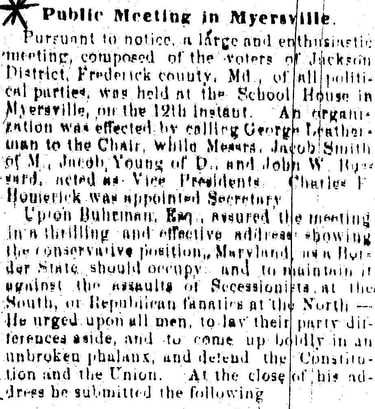
Frederick Examiner, 16 January, 1861
Public Meeting in Myersville -- Pursuant to notice, a large and enthusiastic meeting composed of voters Jackson District, Frederick County, MD, of all political parties, was held at the schoolhouse in Myersville on the 12th instant. An organization was effected by calling George Leatherman to the Chair, while Messrs. Jacob Smith of M., Jacob Young of D, and John W. Bussard acted as vice presidents. Charles F. Homerick was appointed secretary.
Upton Burhman, Esq., assured the meeting in a thrilling and effective address showing the conservative position, Maryland as a border state should occupy and maintain against the assaults of the Secessionists at the South or the Republican fanatics of the North. He urged upon all men to lay their party differences aside and to come up boldly in an unbroken phalanx and defend the Constitution and the Union.
A fuller recounting from A Brief History of Middletown Valley by Harry M. Gross, 1932:
"...A meeting was called in Myersville on January 12, 1861. A large enthusiastic crowd gathered at the old schoolhouse in the village. George LEATHERMAN was elected to the post of chairman and the meeting was called to order. A thrilling address was the first thing on the program. The speaker stressed the fact that Maryland was a border state and her position demanded that she maintain a conservative policy. All men must lay aside their party differences and come boldly as an unbroken phalanx to defend the Constitution and the Union.
"The following resolutions were passed: 1. Resolved, that Maryland strictly insist upon having the legal rights which are guaranteed to each state by the Constitution of the United States, namely, that of a republican form of government and protection from invasion. 2. Resolved, that we regard the act of secession upon the part of any state or states as revolution, dangerous to the best interests of our government, and no adequate remedy for the evil now complained of. 3. Resolved, that a rigid enforcement of the federal laws, affording to each state all the privileges and immunities guaranteed by the Constitution of the United States, is the only means by which peace can again be restored to our beloved country. 4. Resolved, that we indignantly repudiate every effort that may be made by corrupt politicians and designing demagogues, to place our state in the attitude of secession or in hostility to the general government. 5. Resolved, that all persons who wage war against the United States Government for the purpose of destroying the Constitution and the Union, made sacred by the blood of our fathers, be regarded as dangerous men and enemies, directly or indirectly to our common country. 6. Resolved, that the Stars and Stripes, the National Flag, is property of the people, and that when legally unfurled, it shall and will be protected to the last extremity by Americaís bravest sons. 7. Resolved, that we have confidence in the strong arm of our government; that we rely upon the patriotism of conservative men in all sections of our country to stay the tide of revolution; and that we will never consent to any alliance with any state or states, other than the United States in Congress assembled, until it is satisfactorily demonstrated that our Union is a failure, and that man is incapable of self-government, and that the declaration of the Hero of New Orleans cannot be fulfilled, viz: that the Union must, and shall, be preserved. 8. Resolved, that the above resolutions be signed by the Officers of this meeting, and be published in all of the papers of the county, denying the right of secession.
"The meeting adjourned with three rousing cheers for the Union."
Public Meeting in Myersville -- Pursuant to notice, a large and enthusiastic meeting composed of voters Jackson District, Frederick County, MD, of all political parties, was held at the schoolhouse in Myersville on the 12th instant. An organization was effected by calling George Leatherman to the Chair, while Messrs. Jacob Smith of M., Jacob Young of D, and John W. Bussard acted as vice presidents. Charles F. Homerick was appointed secretary.
Upton Burhman, Esq., assured the meeting in a thrilling and effective address showing the conservative position, Maryland as a border state should occupy and maintain against the assaults of the Secessionists at the South or the Republican fanatics of the North. He urged upon all men to lay their party differences aside and to come up boldly in an unbroken phalanx and defend the Constitution and the Union.
A fuller recounting from A Brief History of Middletown Valley by Harry M. Gross, 1932:
"...A meeting was called in Myersville on January 12, 1861. A large enthusiastic crowd gathered at the old schoolhouse in the village. George LEATHERMAN was elected to the post of chairman and the meeting was called to order. A thrilling address was the first thing on the program. The speaker stressed the fact that Maryland was a border state and her position demanded that she maintain a conservative policy. All men must lay aside their party differences and come boldly as an unbroken phalanx to defend the Constitution and the Union.
"The following resolutions were passed: 1. Resolved, that Maryland strictly insist upon having the legal rights which are guaranteed to each state by the Constitution of the United States, namely, that of a republican form of government and protection from invasion. 2. Resolved, that we regard the act of secession upon the part of any state or states as revolution, dangerous to the best interests of our government, and no adequate remedy for the evil now complained of. 3. Resolved, that a rigid enforcement of the federal laws, affording to each state all the privileges and immunities guaranteed by the Constitution of the United States, is the only means by which peace can again be restored to our beloved country. 4. Resolved, that we indignantly repudiate every effort that may be made by corrupt politicians and designing demagogues, to place our state in the attitude of secession or in hostility to the general government. 5. Resolved, that all persons who wage war against the United States Government for the purpose of destroying the Constitution and the Union, made sacred by the blood of our fathers, be regarded as dangerous men and enemies, directly or indirectly to our common country. 6. Resolved, that the Stars and Stripes, the National Flag, is property of the people, and that when legally unfurled, it shall and will be protected to the last extremity by Americaís bravest sons. 7. Resolved, that we have confidence in the strong arm of our government; that we rely upon the patriotism of conservative men in all sections of our country to stay the tide of revolution; and that we will never consent to any alliance with any state or states, other than the United States in Congress assembled, until it is satisfactorily demonstrated that our Union is a failure, and that man is incapable of self-government, and that the declaration of the Hero of New Orleans cannot be fulfilled, viz: that the Union must, and shall, be preserved. 8. Resolved, that the above resolutions be signed by the Officers of this meeting, and be published in all of the papers of the county, denying the right of secession.
"The meeting adjourned with three rousing cheers for the Union."
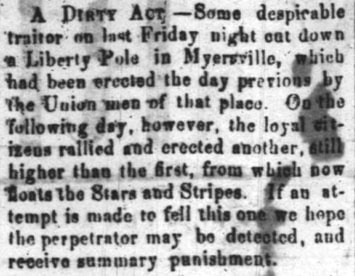
Valley Register, 17 May, 1861
A Dirty Act -- Some despicable traitor on last Friday night cut down a Liberty Pole in Myersville, which had been erected that day previous by the Union men of that place. On the following day, however, the loyal citizens rallied and erected another, still higher than the first, from which now floats the Stars and Stripes. If an attempt is made to fell this one we hope the perpetrator may be detected and receive summary punishment.
A Liberty Pole is a tall wooden pole, often used as a type of flagstaff, planted in the ground, and surmounted by a red Phrygian cap. During the American Revolution, Liberty Poles were raised all over the colonies, and the tradition was renewed during the Civil War. Myersville's Liberty Pole may have included the red Phygian cap, the Stars and Stripes, and other banners and long ribbons painted with patriotic slogans.
Below: Two 18th Century Liberty Poles.
A Dirty Act -- Some despicable traitor on last Friday night cut down a Liberty Pole in Myersville, which had been erected that day previous by the Union men of that place. On the following day, however, the loyal citizens rallied and erected another, still higher than the first, from which now floats the Stars and Stripes. If an attempt is made to fell this one we hope the perpetrator may be detected and receive summary punishment.
A Liberty Pole is a tall wooden pole, often used as a type of flagstaff, planted in the ground, and surmounted by a red Phrygian cap. During the American Revolution, Liberty Poles were raised all over the colonies, and the tradition was renewed during the Civil War. Myersville's Liberty Pole may have included the red Phygian cap, the Stars and Stripes, and other banners and long ribbons painted with patriotic slogans.
Below: Two 18th Century Liberty Poles.
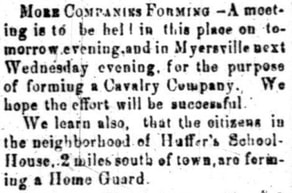
Valley Register, 17 May, 1861
More Companies Forming -- A meeting is to be held in this place [Middletown] on tomorrow evening, and in Myersville next wednesday evening, for the purpose of forming a Cavalry Company. We hope the effort will be successful.
We learn also that the citizens in the neighborhood of Huffer's School House, 2 miles south of town, are forming a Home Guard.
More Companies Forming -- A meeting is to be held in this place [Middletown] on tomorrow evening, and in Myersville next wednesday evening, for the purpose of forming a Cavalry Company. We hope the effort will be successful.
We learn also that the citizens in the neighborhood of Huffer's School House, 2 miles south of town, are forming a Home Guard.
Valley Register, 17 May, 1861
Large Union Meeting --Pursuant to public notice, a large and very respectable number of the inhabitants of Jackson District, Frederick County, MD, met in Myersville on Saturday, the 11th inst. This meeting was composed of men of all the former political parties, viz. of Breckinridge and Douglas Democrats, of Americans and old-line Whigs. The meeting was organized by appointing William Metzger, Esq., as President; David Morgan and Jacob Smith of M, as Vice Presidents, and Wm. R. young as secretary. This meeting was one of a peculiar character. The people convened with a full knowledge of the dangerous condition of their country. Many of them, who heretofore merely looked on and were quiet, see now where the present legislature in convention in Frederick endeavors to lead them or force them, have become aroused and feel they must come up to a man in the discharge of their duties. They see that their property, their lives, and their all, is at stake. You could see a death-like solemnity depicted on the countenances of every man.
The meeting was addressed by Hiram Buhrman, George Koogle, Upton Buhrman, and Jas. Smith, Esq. The speakers made no attempt to display their oratory powers, but they came with their minds filled with the importance of the subject. The whole of their souls was engaged in the matter, and they spoke as they felt and felt as they spoke. And they were convinced that their feelings were right. Every word that fell from their lips did count, and came with power, and had the desired effect. Seriousness pervaded the house from beginning to the end of the meeting....
Large Union Meeting --Pursuant to public notice, a large and very respectable number of the inhabitants of Jackson District, Frederick County, MD, met in Myersville on Saturday, the 11th inst. This meeting was composed of men of all the former political parties, viz. of Breckinridge and Douglas Democrats, of Americans and old-line Whigs. The meeting was organized by appointing William Metzger, Esq., as President; David Morgan and Jacob Smith of M, as Vice Presidents, and Wm. R. young as secretary. This meeting was one of a peculiar character. The people convened with a full knowledge of the dangerous condition of their country. Many of them, who heretofore merely looked on and were quiet, see now where the present legislature in convention in Frederick endeavors to lead them or force them, have become aroused and feel they must come up to a man in the discharge of their duties. They see that their property, their lives, and their all, is at stake. You could see a death-like solemnity depicted on the countenances of every man.
The meeting was addressed by Hiram Buhrman, George Koogle, Upton Buhrman, and Jas. Smith, Esq. The speakers made no attempt to display their oratory powers, but they came with their minds filled with the importance of the subject. The whole of their souls was engaged in the matter, and they spoke as they felt and felt as they spoke. And they were convinced that their feelings were right. Every word that fell from their lips did count, and came with power, and had the desired effect. Seriousness pervaded the house from beginning to the end of the meeting....
Valley Register, 6 September, 1861
Seizure of Arms -- About noon on Monday last a detachment of 30 men from companies B and F of the 4th Connecticut Regiment passed through this place from Myersville in this valley, having in charge a number of State Rifles, found in the possession of Capt. Aaron Poffenberger, of that village, whom they had previously placed under arrest.
The Examiner says: "The information against Captain Poffenberger was that he had, by handbill, recently called in these riffles from the possession of persons belonging to a company he commanded from 1845 to 1848, and that he was in the habit of drilling a number of his partisan friends in the use of this deadly arm. He denied that he was a Secession sympathizer and declared himself a Union man. He was then asked to surrender then and promptly complied by giving up 4 stand; whereupon he he was released from arrest. The rifles have been given one of the companies of the 'Home Brigade' for guard duty."
Seizure of Arms -- About noon on Monday last a detachment of 30 men from companies B and F of the 4th Connecticut Regiment passed through this place from Myersville in this valley, having in charge a number of State Rifles, found in the possession of Capt. Aaron Poffenberger, of that village, whom they had previously placed under arrest.
The Examiner says: "The information against Captain Poffenberger was that he had, by handbill, recently called in these riffles from the possession of persons belonging to a company he commanded from 1845 to 1848, and that he was in the habit of drilling a number of his partisan friends in the use of this deadly arm. He denied that he was a Secession sympathizer and declared himself a Union man. He was then asked to surrender then and promptly complied by giving up 4 stand; whereupon he he was released from arrest. The rifles have been given one of the companies of the 'Home Brigade' for guard duty."
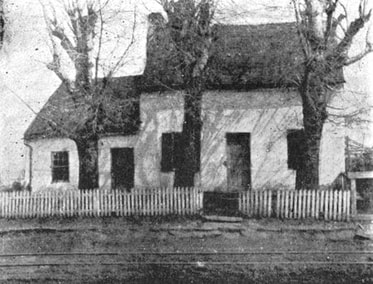
Frederick Examiner, 11 September, 1861
Note: The scanned image of the original newspaper is not reproducible.
Denial – We have received a note from Capt. Aaron Poffenberger, from whose possession a seizure of 41 minie rifles was recently made at Myersville, denying that “he was in the habit of drilling a number of his partisan friends in the use of this deadly __,” as we had been informed. We cheerfully give the Capt. the benefit of his denial, and are glad to learn his __; that he had placed the weapons in the hands of a good Union man instead. The other facts stated in this connection last week, are admitted to have been correct.
Left: The circa-1790 tavern at 203 Main Street, Myersville, owned by Capt. Poffenberger in 1861. It was razed circa 1905 for a house built by John Caleb Leatherman.
Note: The scanned image of the original newspaper is not reproducible.
Denial – We have received a note from Capt. Aaron Poffenberger, from whose possession a seizure of 41 minie rifles was recently made at Myersville, denying that “he was in the habit of drilling a number of his partisan friends in the use of this deadly __,” as we had been informed. We cheerfully give the Capt. the benefit of his denial, and are glad to learn his __; that he had placed the weapons in the hands of a good Union man instead. The other facts stated in this connection last week, are admitted to have been correct.
Left: The circa-1790 tavern at 203 Main Street, Myersville, owned by Capt. Poffenberger in 1861. It was razed circa 1905 for a house built by John Caleb Leatherman.
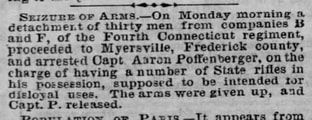
Baltimore Sun, 5 September, 1861
Seizure of Arms -- On Monday morning a detachment of thirty men from companies B and F of the Fourth Connecticut regiment, proceeded to Myersville, Frederick county, and arrested Capt. Aaron Poffenberger on the charge of having a number of State rifles in his possession, supposed to be intended for disloyal uses. The arms were given up and Capt. P. released.
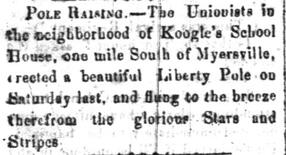
Valley Register, 28 February, 1862
Pole Raising -- The Unionists in the neighborhood of Koogle's School House, one mile south of Myersville, erected a beautiful Liberty Pole on saturday last, and flung to the breeze therefrom the glorious Stars and Stripes.
Pole Raising -- The Unionists in the neighborhood of Koogle's School House, one mile south of Myersville, erected a beautiful Liberty Pole on saturday last, and flung to the breeze therefrom the glorious Stars and Stripes.
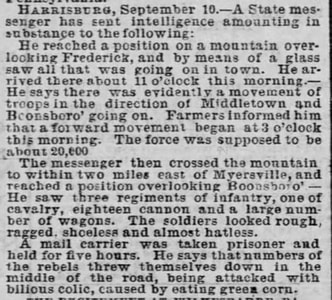
Baltimore Sun, 12 September, 1862.
Harrisburg, September 10 -- A state messenger has sent intelligence amounting in substance to the following:
He reached a position on the mountain over-looking Frederick, and by means of a glass saw all that was going on in town. He arrived there about 11 o'clock this morning. He says there was evidently movement of troops in the direction of Middletown and Boonsboro going on. Farmers informed him that forward movement began at 3 o'clock this morning. The force was supposed to be about 20,000.
The messenger then crossed the mountain to within two miles east of Myersville, and reached a position overlooking Boonsboro. He saw three regiments of infantry, one of cavalry, eighteen cannon and a large number of wagons. The soldiers looked rough, ragged, shoeless, and almost hatless.
A mail carrier was taken prisoner and held for five hours. He says that numbers of the rebels threw themselves down in the middle of the road, being attacked with bilious colic, caused by eating green corn.
Above: Union Troops Marching toward South Mountain through Middletown, 14 September, 1862. Sketch by Alfred Rudolph Waud (1828-1891). Courtesy Library of Congress. Below: South Mountain battle map.
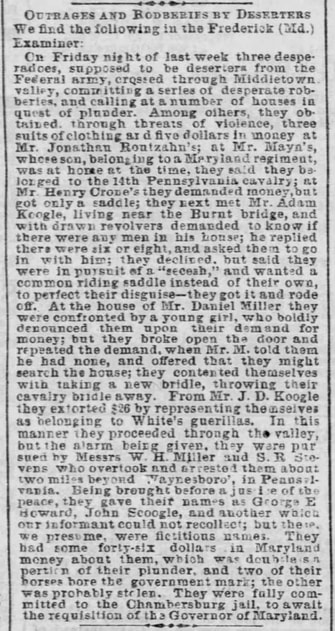
Baltimore Sun, 3 January, 1863.
Outrages and Robberies by Deserters -- On Friday night of last week, three desperadoes supposed to be deserters from the Federal army, crossed through Middletown Valley, committing a series of desperate robberies, and calling at a number of houses in quest of plunder. Among others they obtained through threats of violence three suits of clothing and five dollars in money at Mr. Jonathan Routzahn's; at Mr. Mayn's, whose son belonging to a Maryland regiment, was at home at the time, they said they belonged to they belonged to the 14th Pennsylvania cavalry; at Mr. Henry Crone's they demanded money, but got only a saddle; they next met Mr. Adam Koogle, living near the Burnt bridge, and with drawn revolvers, demanded to know if there were any men in his house; he replied that there were six or eight, and asked them to go in with them; they declined, but said they were in pursuit of a "seceah" and wanted a common riding saddle instead of their own, to perfect the disguise -- they got it and rode off.
At the house of Mr. Daniel Miller they were confronted by a young girl, who boldly denounced them upon their demand for money; but they broke open the door and repeated the demand, when Mr. M told them he had none and offered that they might search the house; they contented themselves with taking a new bridle, throwing their cavalry bridle away. From Mr. J. D. Koogle they extorted $26 by representing themselves as belonging to White's guerillas. In this manner, they proceeded through the valley, but the alarm being given, they were pursued by Messrs W. H. Miller and S. R. Stevens, who overtook and arrested them about two miles beyond Waynesboro in Pennsylvania.
Being brought before justice of the peace, they gave their names as George E. Howard, John Scoogle, and another which our informant could not recollect , but these we presume, were fictitious names. They some forty-six dollars in maryland money about them, which was doubtless a portion of their plunder, and two of their horses bore the government mark; they other was probably stolen. They were fully committed to the Chambersburg jail to awat the requisition of the Governor of Maryland.
Outrages and Robberies by Deserters -- On Friday night of last week, three desperadoes supposed to be deserters from the Federal army, crossed through Middletown Valley, committing a series of desperate robberies, and calling at a number of houses in quest of plunder. Among others they obtained through threats of violence three suits of clothing and five dollars in money at Mr. Jonathan Routzahn's; at Mr. Mayn's, whose son belonging to a Maryland regiment, was at home at the time, they said they belonged to they belonged to the 14th Pennsylvania cavalry; at Mr. Henry Crone's they demanded money, but got only a saddle; they next met Mr. Adam Koogle, living near the Burnt bridge, and with drawn revolvers, demanded to know if there were any men in his house; he replied that there were six or eight, and asked them to go in with them; they declined, but said they were in pursuit of a "seceah" and wanted a common riding saddle instead of their own, to perfect the disguise -- they got it and rode off.
At the house of Mr. Daniel Miller they were confronted by a young girl, who boldly denounced them upon their demand for money; but they broke open the door and repeated the demand, when Mr. M told them he had none and offered that they might search the house; they contented themselves with taking a new bridle, throwing their cavalry bridle away. From Mr. J. D. Koogle they extorted $26 by representing themselves as belonging to White's guerillas. In this manner, they proceeded through the valley, but the alarm being given, they were pursued by Messrs W. H. Miller and S. R. Stevens, who overtook and arrested them about two miles beyond Waynesboro in Pennsylvania.
Being brought before justice of the peace, they gave their names as George E. Howard, John Scoogle, and another which our informant could not recollect , but these we presume, were fictitious names. They some forty-six dollars in maryland money about them, which was doubtless a portion of their plunder, and two of their horses bore the government mark; they other was probably stolen. They were fully committed to the Chambersburg jail to awat the requisition of the Governor of Maryland.
Valley Register, 10 July, 1863
A Lively Time -- Many of the scenes of last fall are again being witnessed in this portion of Maryland, in the activity that belongs to the presence of a great army in pursuit of flying enemy. The defeat and subsequent retreat of the impudent Rebel Army, which so recently invaded Pennsylvania and maryland, has again caused our beautiful valley to be overrun with soldiers, this route bein the nearest by which Gen. Meade could hope to intercept them. The movement of the troops through this place to the Upper Potomac commenced last Saturday evening, when a brigade of Gen. French's division commanded by Gen Morris, passed through and took possession of all the gaps of South Mountain. On Monday morning, Gen. Buford's cavalry, 5,000 strong, with an abundance of artillery, passed through and on Tuesday evening, the main body of the army began to arrive and push forward, and have so continued night and day, up to the time of our going to press. The veteran soldiers, though travel-worn and battle-scarred, are yet bouyant and enthusiastic, and move with vigor and renewed courge, in the hope of intercepting Lee's flying and demoralized troops.
Gen Couch has also pushed forward with all his effective forces to ...??... to with and join the Army of the Potomac. His advance is already reported to have come in contact with the retreating enemy.
Gen. Meade established his headquarters in this place [Middletown] last Wednesday morning, and remained until yesterday noon.
There is an almost total suspension of business here. The stores even, having disposed of every article called for by the soldiers, are closed. Amidst all the bustle and excitement we have issued our paper, but not without much hindrance.
A Lively Time -- Many of the scenes of last fall are again being witnessed in this portion of Maryland, in the activity that belongs to the presence of a great army in pursuit of flying enemy. The defeat and subsequent retreat of the impudent Rebel Army, which so recently invaded Pennsylvania and maryland, has again caused our beautiful valley to be overrun with soldiers, this route bein the nearest by which Gen. Meade could hope to intercept them. The movement of the troops through this place to the Upper Potomac commenced last Saturday evening, when a brigade of Gen. French's division commanded by Gen Morris, passed through and took possession of all the gaps of South Mountain. On Monday morning, Gen. Buford's cavalry, 5,000 strong, with an abundance of artillery, passed through and on Tuesday evening, the main body of the army began to arrive and push forward, and have so continued night and day, up to the time of our going to press. The veteran soldiers, though travel-worn and battle-scarred, are yet bouyant and enthusiastic, and move with vigor and renewed courge, in the hope of intercepting Lee's flying and demoralized troops.
Gen Couch has also pushed forward with all his effective forces to ...??... to with and join the Army of the Potomac. His advance is already reported to have come in contact with the retreating enemy.
Gen. Meade established his headquarters in this place [Middletown] last Wednesday morning, and remained until yesterday noon.
There is an almost total suspension of business here. The stores even, having disposed of every article called for by the soldiers, are closed. Amidst all the bustle and excitement we have issued our paper, but not without much hindrance.
A List of All Men in the Wolfsville-Myersville Area Subject to Do Military Duty, July 1863. The men were Epham L. Moser; Ezra Valentine Moser; John Henry Moser; Hezekiah Michael; Charles E. Mullen; Wesley Marker; Elias Marker; Lewis Marker; Ezra Moser; and Josiah Moser. The list shows just how depleted the local male population was, with many already serving and others too old, handicapped, or otherwise exempted. It is interesting to note that in Myersville, Lewis Moser was diagnosed with Consumption (Tuberculosis) and Josiah Moser was deaf and mute.
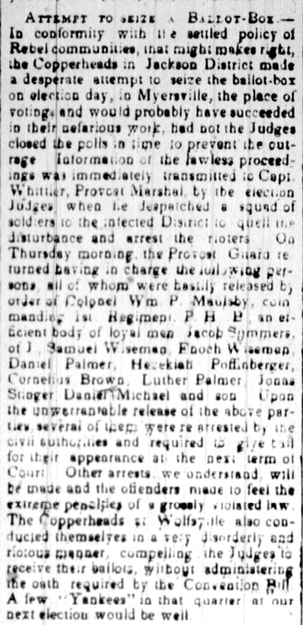
Frederick Examiner, 2 April, 1864
Attempt to Seize a Ballot Box -- In conformity with the settled policy of Rebel communities, that might makes right, the Copperheads in Jackson District made a desperate attempt to seize the ballot box on election day, in Myersville, the place of voting, and would probably have succeeded in their nefarious work, had not the Judges closed the polls in time to prevent the outrage.
Information of the lawless proceedings was immediately transmitted to Capt. Whittier, Provost marshall, by the election Judges, when he despatched a squad of soldier to the infected to quell the disturbance and arrest the rioters.
On Thursday morning, the Provost Guard returned having in charge the following persons, all of whom were hastily released by order of Colonel Wm. P. Maulsby, commanding 1st Regiment PHB, an efficient body of loyal men: Jacob Summers of J, Samuel Wiseman, Enoch Wiseman, Daniel Palmer, Hezekiah Poffinberger, Cornelious Brown, Luther Palmer, Jonas Scoger, Daniel Michael and son.
Upon the unwarrantable release of the above parties, several of them were rearrested by the civilian authorities and required to give bail for their appearance at the next term of Court. Other arrests, we understand, will be made and the offenders made to feel the extreme penalties of a grossly violated law.
The Copperheads at Wolfsville also conducted themselves in a very disorderly and riotous manner, compelling Judges to receive their ballots without administering the oath required by the Convention Bill. A few "Yankees" in that quarter at our next election would be well.
Attempt to Seize a Ballot Box -- In conformity with the settled policy of Rebel communities, that might makes right, the Copperheads in Jackson District made a desperate attempt to seize the ballot box on election day, in Myersville, the place of voting, and would probably have succeeded in their nefarious work, had not the Judges closed the polls in time to prevent the outrage.
Information of the lawless proceedings was immediately transmitted to Capt. Whittier, Provost marshall, by the election Judges, when he despatched a squad of soldier to the infected to quell the disturbance and arrest the rioters.
On Thursday morning, the Provost Guard returned having in charge the following persons, all of whom were hastily released by order of Colonel Wm. P. Maulsby, commanding 1st Regiment PHB, an efficient body of loyal men: Jacob Summers of J, Samuel Wiseman, Enoch Wiseman, Daniel Palmer, Hezekiah Poffinberger, Cornelious Brown, Luther Palmer, Jonas Scoger, Daniel Michael and son.
Upon the unwarrantable release of the above parties, several of them were rearrested by the civilian authorities and required to give bail for their appearance at the next term of Court. Other arrests, we understand, will be made and the offenders made to feel the extreme penalties of a grossly violated law.
The Copperheads at Wolfsville also conducted themselves in a very disorderly and riotous manner, compelling Judges to receive their ballots without administering the oath required by the Convention Bill. A few "Yankees" in that quarter at our next election would be well.
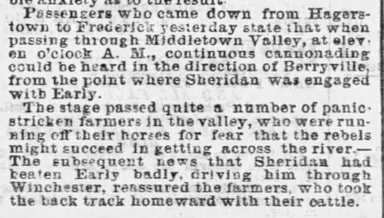
Baltimore Sun, 21 September, 1864
Passengers who came down from Hagerstown to Frederick yesterday state that when passing through Middletown Valley at eleven o'clock a.m., continuous cannonading could be heard in the direction of Berryville from the point where Sheridan was engaged with Early.
The stage passed quite a number of panic-stricken farmers in the valley, who were running off their horses for fear that the rebels might Succeed in getting across the river. The subsequent news that Sheridan had beaten Early badly, driving him through Winchester, reassured the farmers, who took the back track homeward with their cattle.
Passengers who came down from Hagerstown to Frederick yesterday state that when passing through Middletown Valley at eleven o'clock a.m., continuous cannonading could be heard in the direction of Berryville from the point where Sheridan was engaged with Early.
The stage passed quite a number of panic-stricken farmers in the valley, who were running off their horses for fear that the rebels might Succeed in getting across the river. The subsequent news that Sheridan had beaten Early badly, driving him through Winchester, reassured the farmers, who took the back track homeward with their cattle.
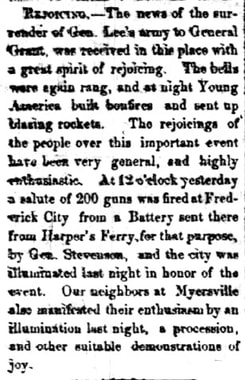
Valley Register, 14 April, 1865:
The news of the surrender of Gen. Lee's Army to General Grant was received in this place [Middletown] with a great spirit of rejoicing. The bells were again rung, and at night Young America built bonfires and sent up blazing rockets. The rejoicings of the people over this important event have been very general, and highly enthusiastic. At 12 o'clock yesterday a salute of 200 guns was fired by Frederick City from a Battery sent there from Harper's Ferry for that purpose by General Stevenson, and the city was illuminated last night in honor of the event. Our neighbors at Myersville also manifested their enthusiasm by an illumination last night, a procession, and suitable demonstrations of joy.
The news of the surrender of Gen. Lee's Army to General Grant was received in this place [Middletown] with a great spirit of rejoicing. The bells were again rung, and at night Young America built bonfires and sent up blazing rockets. The rejoicings of the people over this important event have been very general, and highly enthusiastic. At 12 o'clock yesterday a salute of 200 guns was fired by Frederick City from a Battery sent there from Harper's Ferry for that purpose by General Stevenson, and the city was illuminated last night in honor of the event. Our neighbors at Myersville also manifested their enthusiasm by an illumination last night, a procession, and suitable demonstrations of joy.
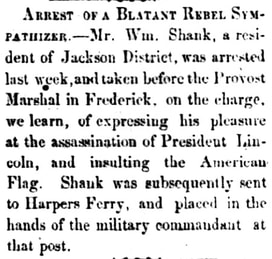
Valley Register, 28 April, 1865
Arrest of Blatant Rebel Sympathizer -- Mr. William Shank, a resident of Jackson District, was arrested last week and taken before the Provost Marshal in Frederick on the charge, we learn, of expressing his pleasure at the assassination of President Lincoln, and insulting the American flag. Shank was subsequently sent to Harper's Ferry and placed in the hands of the military commandant at that post.
William Shank (1825-1903) was a Myersville-area cooper. He is buried in St. Paul's Lutheran Church Cemetery with his wife, Susan.
Arrest of Blatant Rebel Sympathizer -- Mr. William Shank, a resident of Jackson District, was arrested last week and taken before the Provost Marshal in Frederick on the charge, we learn, of expressing his pleasure at the assassination of President Lincoln, and insulting the American flag. Shank was subsequently sent to Harper's Ferry and placed in the hands of the military commandant at that post.
William Shank (1825-1903) was a Myersville-area cooper. He is buried in St. Paul's Lutheran Church Cemetery with his wife, Susan.
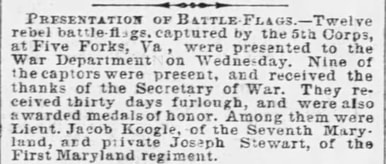
Baltimore Sun, 28 April,1865
Presentation of Battle Flags -- Twelve rebel battle-flags, captured by the 5th Corps at Five Forks, Va., were presented to the War Department on Wednesday. Nine of the captors were present, and received the thanks of the Secretary of War. They received thirty days furlough, and were also awarded metals of honor. Among them were Lieut. Jacob Koogle, of the Seventh Maryland, and private Joseph Stewart, of the First Maryland regiment.
Presentation of Battle Flags -- Twelve rebel battle-flags, captured by the 5th Corps at Five Forks, Va., were presented to the War Department on Wednesday. Nine of the captors were present, and received the thanks of the Secretary of War. They received thirty days furlough, and were also awarded metals of honor. Among them were Lieut. Jacob Koogle, of the Seventh Maryland, and private Joseph Stewart, of the First Maryland regiment.
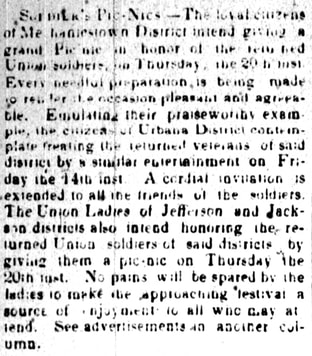
Frederick Examiner, 12 July, 1865
Soldiers' Pic-Nics – The loyal citizens of Mechanicstown District intend giving a grand pic-nic in honor of the returned Union soldiers, on Thursday, the 29th inst. Every needful preparation is being made to render the occasion pleasant and agreeable. Emulating their praiseworthy example, the citizens of Urbana District contemplate treating the returned veterans of said district by a smaller entertainment on Friday the 14th inst. A cordial invitation is extended to all the friends of the soldiers. The Union Ladies of Jefferson and Jackson districts also intend honoring the returned union soldiers of said districts by giving them a pic-nic on Thursday the 20th inst. No pains will be spared by the ladies to make the approaching festival a source of enjoyment to all who may attend. See advertisements in another column.
Soldiers' Pic-Nics – The loyal citizens of Mechanicstown District intend giving a grand pic-nic in honor of the returned Union soldiers, on Thursday, the 29th inst. Every needful preparation is being made to render the occasion pleasant and agreeable. Emulating their praiseworthy example, the citizens of Urbana District contemplate treating the returned veterans of said district by a smaller entertainment on Friday the 14th inst. A cordial invitation is extended to all the friends of the soldiers. The Union Ladies of Jefferson and Jackson districts also intend honoring the returned union soldiers of said districts by giving them a pic-nic on Thursday the 20th inst. No pains will be spared by the ladies to make the approaching festival a source of enjoyment to all who may attend. See advertisements in another column.
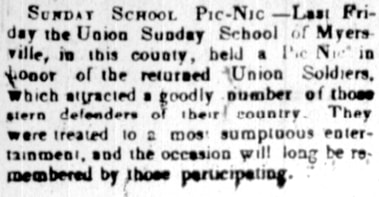
Frederick Examiner, 6 September, 1865
Sunday School Pic-Nic -- Last Friday the Union Sunday School of Myersville, in this county, held a pic-nic in honor of returned Union soldiers, which attracted a goodly number of those stern defenders of their country. They were treated to a most sumptuous entertainment and the occasion will long be remembered by those participating.
Sunday School Pic-Nic -- Last Friday the Union Sunday School of Myersville, in this county, held a pic-nic in honor of returned Union soldiers, which attracted a goodly number of those stern defenders of their country. They were treated to a most sumptuous entertainment and the occasion will long be remembered by those participating.
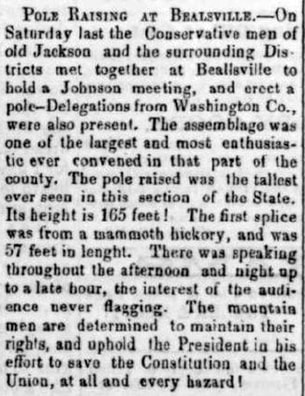
Valley Register, 26 October, 1866
Pole Raising at Beallsville [Harmony] -- On Saturday last, the Conservative men of old Jackson and the surrounding districts met together at Beallsville to hold a Johnson meeting and erect a pole. Delegation from Washington Co. were also present. The assemblage was one of the largest and most enthusiastic ever convened in that part of the county. The pole raised was the tallest ever seen in this section of the state. It's height is 165 feet! The first splice ws from a mammoth hickory and was 57 feet in height. There was speaking throughout the afternoon and night to a late hour, the interest of the audience never flagging. The Mountain men are determined to maintain their rights and uphold the President in his effort to save the Constitution and the Union at all and every hazard!
Below: Dedication Day at the Antietam National Cemetery on 17 September, 1880, taken by Wolfsville native Elias Marken Recher. To the right of the image appears what is likely the type of Liberty Pole raised in Harmony in 1866.
Pole Raising at Beallsville [Harmony] -- On Saturday last, the Conservative men of old Jackson and the surrounding districts met together at Beallsville to hold a Johnson meeting and erect a pole. Delegation from Washington Co. were also present. The assemblage was one of the largest and most enthusiastic ever convened in that part of the county. The pole raised was the tallest ever seen in this section of the state. It's height is 165 feet! The first splice ws from a mammoth hickory and was 57 feet in height. There was speaking throughout the afternoon and night to a late hour, the interest of the audience never flagging. The Mountain men are determined to maintain their rights and uphold the President in his effort to save the Constitution and the Union at all and every hazard!
Below: Dedication Day at the Antietam National Cemetery on 17 September, 1880, taken by Wolfsville native Elias Marken Recher. To the right of the image appears what is likely the type of Liberty Pole raised in Harmony in 1866.
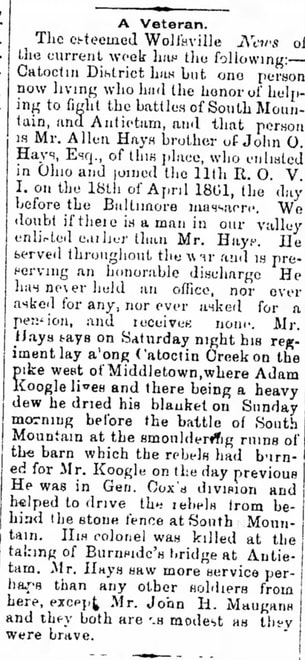
Catoctin Clarion, 6 August, 1887
A Veteran -- The esteemed Wolfsville News of the current week has the following: -- Catoctin District has but one person now living who had the honor of helping to fight the battles of South Mountain and Antietam, and that person is Mr. Allen Hays, brother of John O. Hays, Esq., of this place, who enlisted in Ohio and joined the 11th R.O.V.I. on the 18th of April 1861, the day before the Baltimore Massacre.
We doubt there is a man in our valley enlisted earlier than Mr. Hays. He served throughout the war and is preserving an honorable discharge. He has never held an office, nor ever asked for any, nor ever asked for a pension, and receives none.
Mr. Hayes says that on Saturday night his regiment lay along Catoctin Creek where Adam Koogle lives, and there being a heavy dew, he dried his blanket on Sunday morning before the battle of South Mountain at the smoldering ruins of the barn which the Rebels had burned for Mr. Koogle on the previous day.
He was in General Cox's division and helped to drive the Rebels from behind the stone fence at South Mountain. His colonel was killed at the taking of Burnside's Bridge at Antietam.Mr. Hays saw more service perhaps than any other soldiers from here, except John H. Maugans and they were both as modest as they were brave.
A Veteran -- The esteemed Wolfsville News of the current week has the following: -- Catoctin District has but one person now living who had the honor of helping to fight the battles of South Mountain and Antietam, and that person is Mr. Allen Hays, brother of John O. Hays, Esq., of this place, who enlisted in Ohio and joined the 11th R.O.V.I. on the 18th of April 1861, the day before the Baltimore Massacre.
We doubt there is a man in our valley enlisted earlier than Mr. Hays. He served throughout the war and is preserving an honorable discharge. He has never held an office, nor ever asked for any, nor ever asked for a pension, and receives none.
Mr. Hayes says that on Saturday night his regiment lay along Catoctin Creek where Adam Koogle lives, and there being a heavy dew, he dried his blanket on Sunday morning before the battle of South Mountain at the smoldering ruins of the barn which the Rebels had burned for Mr. Koogle on the previous day.
He was in General Cox's division and helped to drive the Rebels from behind the stone fence at South Mountain. His colonel was killed at the taking of Burnside's Bridge at Antietam.Mr. Hays saw more service perhaps than any other soldiers from here, except John H. Maugans and they were both as modest as they were brave.
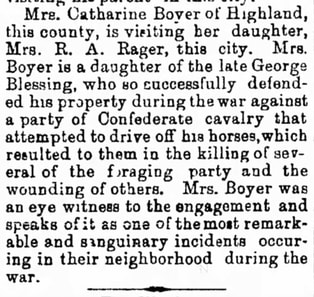
Frederick News, 12 October, 1887
Mrs. Catharine Boyer of Highland, this county, is visiting her daughter, Mrs. R. A. Rager, this city. Mrs. Boyer is the daughter of the late George Blesing, who so successfully defended his property during the war against a party of Confederate calvary that attempted to drive off his horses, which resulted to them in the killing of several of the foraging party and the wounding of others. Mrs. Boyer was an eye witness to the engagement and speaks of it as one of the most remarkable and sanguinary incidents occurring the neighborhood during the war.
Mrs. Catharine Boyer of Highland, this county, is visiting her daughter, Mrs. R. A. Rager, this city. Mrs. Boyer is the daughter of the late George Blesing, who so successfully defended his property during the war against a party of Confederate calvary that attempted to drive off his horses, which resulted to them in the killing of several of the foraging party and the wounding of others. Mrs. Boyer was an eye witness to the engagement and speaks of it as one of the most remarkable and sanguinary incidents occurring the neighborhood during the war.
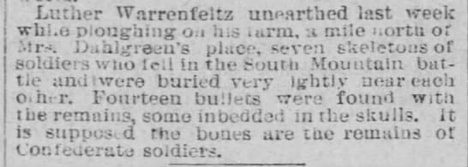
Baltimore Sun, 23 May, 1892.
Luther Warrenfeltz unearthed last week while ploughing on his [Wolfsville] farm, a mile north of Mrs. Dahlgreen's place, seven skeletons of soldiers who fell in the South Mountain battle and were buried very tightly near each other. Fourteen bullets were found with the remains, some imbedded in the skulls. It is supposed the bones were the remains of Confederate soldiers.
Luther Warrenfeltz unearthed last week while ploughing on his [Wolfsville] farm, a mile north of Mrs. Dahlgreen's place, seven skeletons of soldiers who fell in the South Mountain battle and were buried very tightly near each other. Fourteen bullets were found with the remains, some imbedded in the skulls. It is supposed the bones were the remains of Confederate soldiers.
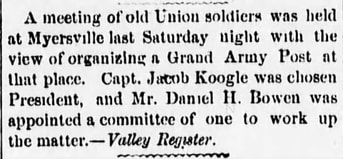
Catoctin Clarion, 23 June, 1892
A meeting of Union Soldiers was held at Myersville last Saturday night with the view of organizing a Grand Army Post at that place. Capt. Jacob Koogle was chosen President, and Mr. Daniel H. Bowen was appointed a committee of one to work up the the matter.
A meeting of Union Soldiers was held at Myersville last Saturday night with the view of organizing a Grand Army Post at that place. Capt. Jacob Koogle was chosen President, and Mr. Daniel H. Bowen was appointed a committee of one to work up the the matter.
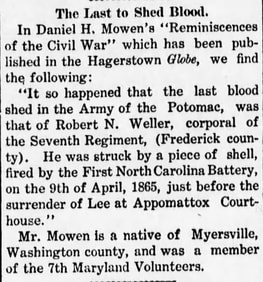
Catoctin Clarion, 23 August, 1906
The Last to Shed Blood -- In Daniel Mowen's "Reminiscences of the Civil War," which has been published in the Hagerstown Globe, we find the following:
"It so happened that the last blood shed in the Army of the Potomac was that of Robert N. Weller, corporal of the Seventh Regiment (Frederick County). He was struck by a piece of shell fired by the First North Carolina Battery on the 9th of April, 1865, just before the surrender of Lee at Appomattox Courthouse."
Mr. Mowen is a native of Myersville, Washington County [sic], and was a member of the 7th Maryland Volunteers.
The Last to Shed Blood -- In Daniel Mowen's "Reminiscences of the Civil War," which has been published in the Hagerstown Globe, we find the following:
"It so happened that the last blood shed in the Army of the Potomac was that of Robert N. Weller, corporal of the Seventh Regiment (Frederick County). He was struck by a piece of shell fired by the First North Carolina Battery on the 9th of April, 1865, just before the surrender of Lee at Appomattox Courthouse."
Mr. Mowen is a native of Myersville, Washington County [sic], and was a member of the 7th Maryland Volunteers.
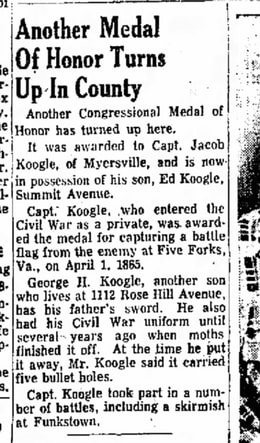
Hagerstown Daily Mail, 20 November, 1953
Another Medal of Honor Turns Up in County -- Another Congressional Medal of Honor has turned up here. It was awarded to Capt. Jacob Koogle, of Myersville, and is now the possession of his son, Ed Koogle, Summit Avenue.
Capt. Koogle, who entered the Civil War as a private, was awarded the medal for capturing a battle flag from the enemy at Five Forks, Va., on April 1, 1865.
George H. Koogle, another son who lives at 1112 Rose Hill Avenue, has his father's sword. He also had his Civil War uniform until a few years ago when the moths finished it off. At the time he put it away, mr. Koogle said it carried five bullet holes.
Capt. Koogle took part in a number of battles, including a skirmish at Funkstown.
Another Medal of Honor Turns Up in County -- Another Congressional Medal of Honor has turned up here. It was awarded to Capt. Jacob Koogle, of Myersville, and is now the possession of his son, Ed Koogle, Summit Avenue.
Capt. Koogle, who entered the Civil War as a private, was awarded the medal for capturing a battle flag from the enemy at Five Forks, Va., on April 1, 1865.
George H. Koogle, another son who lives at 1112 Rose Hill Avenue, has his father's sword. He also had his Civil War uniform until a few years ago when the moths finished it off. At the time he put it away, mr. Koogle said it carried five bullet holes.
Capt. Koogle took part in a number of battles, including a skirmish at Funkstown.
